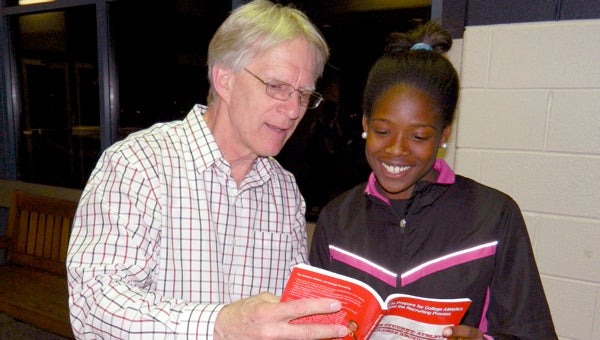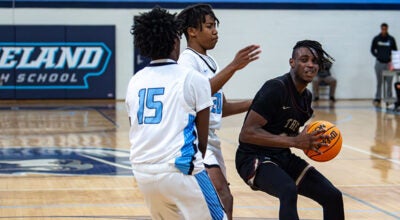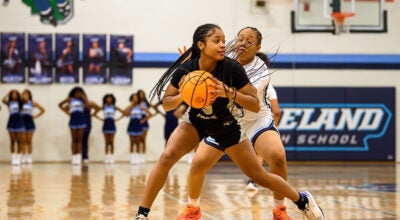Parents, athletes get prepared
Published 10:13 pm Tuesday, May 6, 2014

Rick Wire shows Lakeland sophomore track athlete Teahney Walker his book, “The Student-Athlete and College Recruiting,” after his seminar on Monday at Lakeland High School.
A crowd of 125 parents and student-athletes learned the ins and outs of college athletic recruiting during a special seminar at Lakeland High School on Monday.
Lakeland activities director Gregory Rountree arranged the event, noticing many parents of his student-athletes were uninformed about how to secure a college athletic scholarship.
“I wanted to bring somebody in that has been through the process,” he said.
That person was Rick Wire, president of Dynamite Sports, who started the Pennsylvania-based business in 1995 to help educate high school student-athletes, parents, coaches and counselors about college sports. He is the father of Coy Wire, a nine-year NFL veteran.
While his son was aspiring to play college football, Rick Wire studied how to help Coy achieve his dream, helping his son become the top recruit in his community and eventually receive a scholarship to play for Stanford University. His seminar is based on the experience he and his son had.
Wire began the session discussing the importance of being strong academically to be attractive as an athletic recruit and outlined the eligibility requirements.
He also hailed the benefits of playing for schools not within the NCAA, but rather the National Association of Intercollegiate Athletics, which offers $450 million in aid.
Wire’s firsthand experience was just the kind of thing Suffolk students and their parents were seeking on Monday.
“I was looking for information on where to start for colleges,” Lakeland junior cross country runner and soccer player Jake Crowell said.
His mother, Kim Crowell added, “I know how well he does locally; I didn’t know where he would stand globally.”
Wire highlighted the difficulties of transitioning to college athletics and cited some of the recruiting standards at the top levels. He also noted any recruit should physically look like a college athlete by their junior high school year.
“I was just coming to see if I was molded for college sports, if I could even get scholarship money for playing sports,” said Julianna Durand, a junior star soccer player for Lakeland.
She said one of her biggest takeaways from the seminar was Wire’s story about a Division I athlete, “the really big guy who was the star of his little town, and then went to college and was like the little guy. I think that’s me.”
Lakeland sophomore baseball player Brevin Parrish said he wants to play at the D1 college level, and he learned on Monday to simply “work hard, try my best at everything.”
Tijuana Parrish, Brevin’s mother, said she “didn’t realize there were so many different divisions, so I learned a lot.”
Listing the ways parents can market their children, including by creating highlight/skill DVDs and information packets to send to colleges, Wire also told parents, “You can’t let love get in the way.”
He said they should be realistic in lining up their child’s skill-level with the available college divisions.
“It was helpful,” Kim Crowell said of the session. “It was a little intimidating, in all fairness, but in hindsight, hearing it at (Jake’s) junior year — I wish I had heard it three years earlier.”





